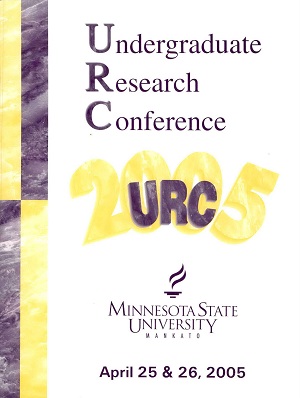The Introduction of Irrelevent Topics in Spontaneous Speech by Children with William's Syndrome and Typically Developing Children
Location
CSU 253
Start Date
25-4-2005 1:15 PM
End Date
25-4-2005 3:15 PM
Student's Major
Speech, Hearing, and Rehabilitation Services
Student's College
Allied Health and Nursing
Mentor's Name
Patricia Hargrove
Mentor's Department
Speech, Hearing, and Rehabilitation Services
Mentor's College
Allied Health and Nursing
Description
This project addressed the communication skills of speakers with Williams syndrome. Speakers with Williams syndrome are of interest to speech-language pathologists because of many puzzling features. Speakers with Williams syndrome "are noted for their well developed vocabulary, relatively complex and syntactically correct sentences, and their ability to spin a good tale. In contrast, their reasoning usually remains at a pre-operational or preschool level, and they typically have difficulty grasping cause-effect relations" (Semel & Rosner, 2003, p. 5). This research focused on an area of communication called pragmatics which involves the social use of language. Specifically, we looked at the frequency of irrelevant topics produced in a conversation. Twelve participants, six with Williams syndrome and six typically developing peers, individually conversed with a graduate clinician on a topic of their interest. The conversations were analyzed for the frequency of irrelevant topics (an abrupt change in subject matter that has no relation to previous or present subject matter.) The findings indicated that the participants with Williams syndrome exhibited significantly more introductions of irrelevant topics than their typically developing peers. This suggests that speakers with Williams syndrome may have more difficulty with conversation and pragmatics than expected.
The Introduction of Irrelevent Topics in Spontaneous Speech by Children with William's Syndrome and Typically Developing Children
CSU 253
This project addressed the communication skills of speakers with Williams syndrome. Speakers with Williams syndrome are of interest to speech-language pathologists because of many puzzling features. Speakers with Williams syndrome "are noted for their well developed vocabulary, relatively complex and syntactically correct sentences, and their ability to spin a good tale. In contrast, their reasoning usually remains at a pre-operational or preschool level, and they typically have difficulty grasping cause-effect relations" (Semel & Rosner, 2003, p. 5). This research focused on an area of communication called pragmatics which involves the social use of language. Specifically, we looked at the frequency of irrelevant topics produced in a conversation. Twelve participants, six with Williams syndrome and six typically developing peers, individually conversed with a graduate clinician on a topic of their interest. The conversations were analyzed for the frequency of irrelevant topics (an abrupt change in subject matter that has no relation to previous or present subject matter.) The findings indicated that the participants with Williams syndrome exhibited significantly more introductions of irrelevant topics than their typically developing peers. This suggests that speakers with Williams syndrome may have more difficulty with conversation and pragmatics than expected.
Recommended Citation
Anderson, Meggon; Kayla Pudwill; and Katie Trefethren. "The Introduction of Irrelevent Topics in Spontaneous Speech by Children with William's Syndrome and Typically Developing Children." Undergraduate Research Symposium, Mankato, MN, April 25, 2005.
https://cornerstone.lib.mnsu.edu/urs/2005/poster-session-A/4




